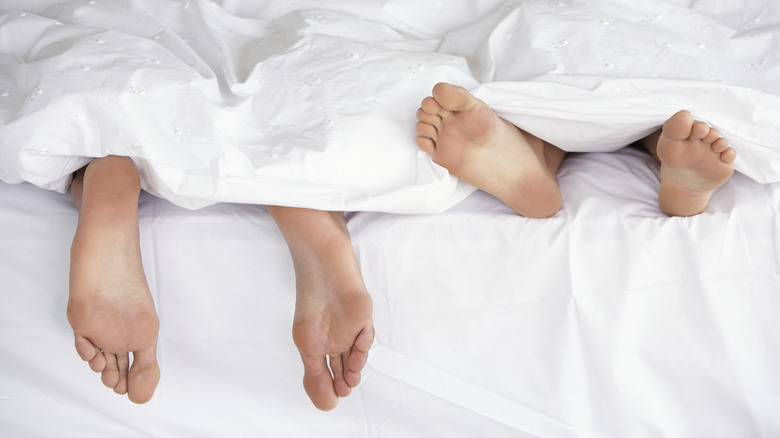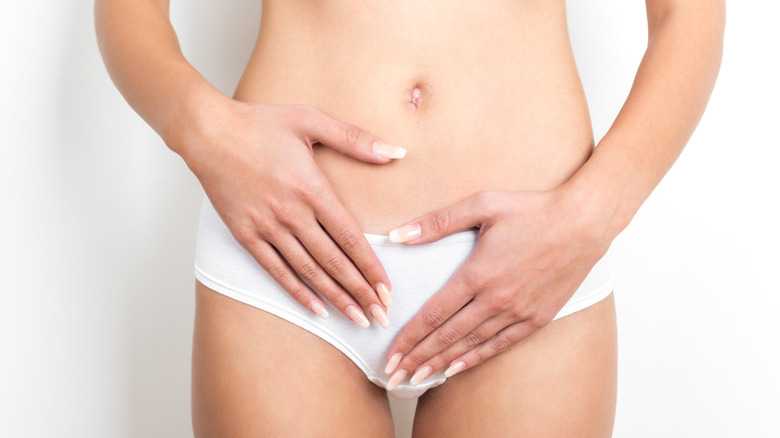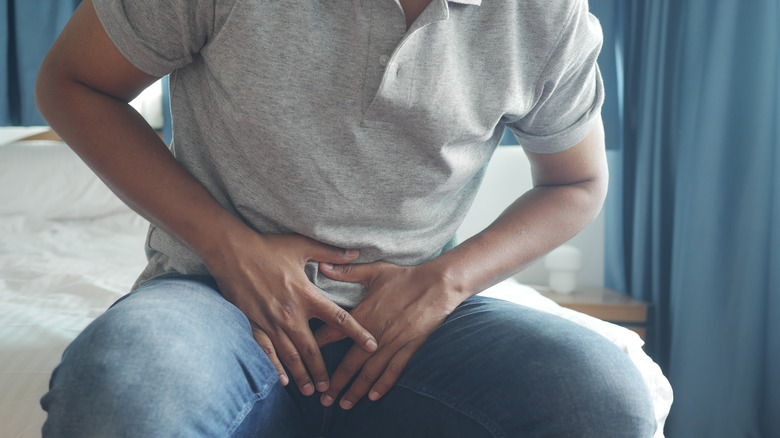Weird Things That Can Happen To Your Body After Sex
What happens after sex can often be as meaningful and impactful as the act of sex itself. A 2014 study published in the Archives of Sexual Behavior demonstrated that couples that engaged in post-sex affection, from cuddling to caressing, experienced higher levels of relationship satisfaction. In general, the study showed that intimate bonds and mutual satisfaction are all important parts of the post-sex ritual.
That said, as you and your partner take time to enjoy the afterglow, part of the ritual of caring for each other may involve dealing with some unexpected side effects. During sex, our bodies go through what is called the sexual response cycle (via WebMD). In this cycle, your breathing, heartbeat, and blood pressure all rise, your muscles tense up and contract, and blood flows to the genitals. After orgasm, as your body returns to the state it was in before sex, you may notice some other things happening, some of which may seem alarming at first.
You might be a little sore
Feeling a little soreness in your genitals after sex can be an uncomfortable but normal part of the experience (via Ro). In fact, anywhere between 10% and 28% of women between puberty and menopause can experience post-sex discomfort. The causes of this condition can range from a lack of lubrication to vigorous or long-lasting sex. Additionally, different types of infections, including yeast infections and urinary tract infections, could lead to discomfort in the vagina.
According to the North American Menopause Society, lower estrogen levels in menopausal women can also lead to vaginal soreness after sex. This is because a decrease in estrogen can cause the vagina to produce less lubrication and lose some of its elasticity. Over time, this can lead to pain, soreness, and burning in the vaginal area. In extreme cases, women can also experience tearing and bleeding of the vaginal tissue as the result of a condition known as atrophic vaginitis. Women who are experiencing this kind of pain during and after sex should consult with their doctor or gynecologist to determine the best means of treatment.
There could be some itching
There could be a few reasons you may feel some itching in your genitals after sex (via Medical News Today). If you and your partner are using condoms and one or both of you have a latex allergy, then you may experience soreness, swelling, and itching as a result. This can be caused by the latex triggering a number of allergic reactions, including contact dermatitis or anaphylaxis. In the case of anaphylaxis, that can be a very serious situation, one that requires immediate medical attention.
Some women (and occasionally men) can also experience itching as a result of a semen allergy, which is also known as seminal plasma hypersensitivity (via Cleveland Clinic). The allergy can be localized, affecting only the area that semen comes into contact with, or systemic, affecting the whole body. In the case of a systemic allergy, the affected person may have trouble breathing or experience swelling of the lips or tongue. Local allergic reactions to semen can present as itching, burning, or stinging in the affected area. Usually, a semen allergy can be treated via medication or slow desensitization, but it's best to consult with your doctor if you think you have a semen allergy.
Semen could leak out
If your partner ejaculates inside you and you're not using condoms, you may experience a bit of semen leaking out of you immediately after sex. For couples who are trying to get pregnant, they may be concerned that this leakage could prevent them from conceiving. However, according to Shree IVF Clinic, this is a totally normal phenomenon. In fact, up to 80% of semen can leak out of the vagina after sex.
For couples who are concerned that semen leakage could hinder their chances of conception, babyMed says that less than 5% to 10% of seminal fluid is actually comprised of sperm. Most of what leaks out is comprised of other fluids, such as lubricants and fluids from the prostate. After ejaculation, much of the sperm begins to make its way into the cervix and the uterus, leaving behind the remaining fluid, which simply flows out of the body. A woman who wants to ensure that as little sperm as possible leaks out can try lying on her back for up to 20 minutes with her hips slightly elevated.
Your skin may become flushed
When you're aroused, or during or immediately following an orgasm, you may notice that your skin, including around your genitals, may flush red. This "sex rash" or "sex flush" is something that happens to approximately half of women during and after sex (via Eudelo). Women who experience the sex flush may see pink or reddish patches sprout up on their chest, face, or throughout their body. The reason behind it is an increased flow of blood, and it usually dissipates within an hour or so.
Men and women can both experience the sex flush, and in some cases, it can be strong enough to almost resemble a rash, according to Healthline. It does fade fairly quickly, but if you experience any redness that doesn't go away in a few hours, or localized swelling or redness in the genitals that tends to linger, you may be facing a more pressing issue. If your flushing persists long after you and your partner have finished, you might want to talk to your doctor.
Cramps could flare up
It can be more common than you might think for men and women to experience some cramping after sex, and the causes could be varied. According to Medical News Today, straining your pelvic muscles during sex could be one cause of cramping and discomfort. It could also be the result of dehydration or even having sex in an awkward position. People who suffer from either urinary or bowel conditions, such as a urinary tract infection or irritable bowel syndrome, may also experience stomach or pelvic pain during and after sex.
Additionally, having an orgasm could also be a trigger for cramps or cramping sensations (via MedicineNet). Prostaglandins released during orgasm can cause muscle contractions that can feel similar to cramps. In women, prostaglandins are what cause the uterus to contract during menstruation, according to Healthline. Because of this, in some women, prostaglandins from ejaculate released into the vagina during sex may result in cramping and contractions.
You may feel sleepy
It's not uncommon for both men and women to feel relaxed immediately following a sex session (via Quinn). For one thing, the physical act of sex can be exerting on the body and cause you to feel tired and worn out afterwards. The blood flow and endorphins released can make one feel as though they just worked out, leaving them spent and exhausted. Additionally, an orgasm can release a number of hormones, including oxytocin, serotonin, and melatonin. All of these combined hormones can work together to give you a sleepy, drowsy feeling.
According to a 2019 study published in Frontiers in Public Health, 59% of people profiled reported that they had a better night's sleep after having sex right before bed. However, there were some gender differences. While 68.1% of men reported having slept better after sex, 59.1% of women reported having their sleep improved after sex. Curiously, 11% of women actually noted that their sleep was worsened after sex.
You may notice certain smells
Sometimes, after sex, there could be a variety of scents in the air. Sweat and the natural secretions from the vagina can contribute to the post-sex smell, but the interaction of semen with vaginal bacteria can create a sort of tangy odor (via Health). The reason for this is the different composition of semen versus the vagina. According to Dr. Susie Gronski, vaginas are more acidic, while semen is more alkaline. As a result, the introduction of semen into the vagina could temporarily disrupt the vagina's pH balance.
You might pick up on a slight fishy smell after sex, according to PharmEasy, which could be triggered by anything from food changing the smell and taste of your semen to anal sex. In most cases, these smells aren't cause for concern. But if they don't go away in a few hours, it could be a sign of another condition, including yeast infections or bacterial vaginosis.
Your vagina may swell
For women, swollen labia, or even a swollen clitoris, is not uncommon during or after sex (via Healthline). Blood flow to the area during sexual arousal can cause the genitals to swell. Swelling could also happen during penetration without proper lubrication. According to a 2022 report published in Clinical Practice and Cases in Emergency Medicine, a 25-year-old woman was complaining of tenderness and swelling in the labia after having had five episodes of sex over the course of two hours the day before. After surgical intervention, the swelling was reduced by removing a blood clot from the labia minora.
There are other things that could contribute to labia swelling (via Flo). These include allergic reactions to latex or certain lubricants, sexually transmitted diseases, or a yeast infection. It could also be a result of a cyst on the Bartholin's glands, two glands located on either side of the vaginal opening that aid in lubrication (via the Mayo Clinic). An obstruction in these glands could lead to the formation of a Bartholin's cyst, which can cause swelling.
There might be bleeding
Bleeding after sex, commonly referred to as "postcoital bleeding," is something that impacts approximately nine percent of women (via The Obstetrician & Gynaecologist). There can be a number of things that can cause vaginal bleeding, according to the Cleveland Clinic. If you have a lack of estrogen or are menopausal, you could be suffering from vaginal atrophy or dryness. As a result, the friction of sex could cause bleeding. Additionally, you could suffer from an inflammation of the cervix, known as cervicitis. This condition, which can be caused by anything from bacterial vaginosis to chemical irritation from douches or condoms, can cause both bleeding and vaginal discharge.
You could also be suffering from cervical polyps, which can cause bleeding during and after intercourse (via Jo's Cervical Cancer Trust). Polyps are fairly common and not always cause for concern. They can be caused by inflammation of the cervix, high levels of estrogen, or clogged blood vessels in the cervix. They are usually benign, but you can talk to your doctor about having them removed and possibly screened.










